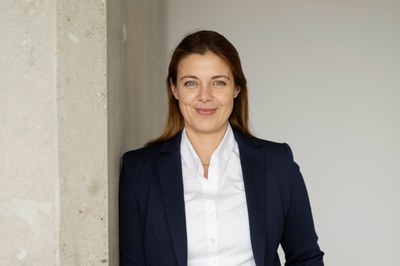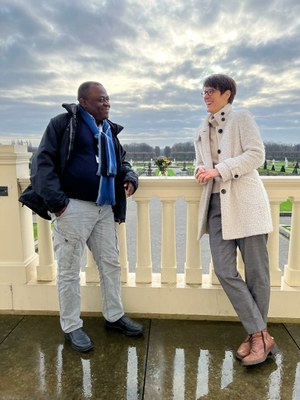Volkswagen Foundation funds two unconventional research projects at the University of Freiburg
Freiburg, Dec 18, 2023
German cultural research in the forest, reflections on colonialism and dignity using the camera – two new research projects at the University of Freiburg take distinctive experimental approaches and are now being funded by the Volkswagen Foundation in its profile area ‘Exploration’. This is in line with the foundation’s aim to support creative and adventurous scientists. On their project, German scholars Dr Joana van de Löcht and Dr Niels Penke are studying dwarfs, ghosts and other mythical beings in the Harz, Black Forest and the Erzgebirge. Philosopher Professor Nadja Germann, German scholar Professor Albert Gouaffo and social scientist Dr Balz Andrea Alter conduct a multimodal dialogue beginning with the dehumanising dimension of colonialism and its effects on scientific practice until the present day.
EcoFolk. On the agency of (super)- natural entities of German low mountain ranges
“We wanted to develop a project that pushed the boundaries of our normal work as literary scholars,” says Dr Joana van de Löcht. Together with her colleague Dr Niels Penke from the University of Siegen, she has already studied moorlands in literature – now, with their new project, they want to jointly study (super-)natural entities from the myths and fairy tales of the Central German Uplands for their ecological and cultural-poetical potential. “In addition, we will wander the landscapes, in order to discover how and where specific entities arose in the natural environment,” explains van de Löcht. For example, in the Black Forest, as well as the water-spirits of the Mummelsee lake, the little glass imp and Dutch Michael from Wilhelm Hauff’s “Heart of Stone” offer material for research.

Dr. Joana van de Löcht. Photo: Nordrhein-Westfälische Akademie der Wissenschaften und der Künste Bettina Engel-Albustin 2022
In the early 19th century, the myths and fairy tales were collected by a variety of people including the Brothers Grimm, and the texts often tend to be disparaged in contemporary literature studies as too ‘simple’. However, in popular cultures they are all the more effective for this simplicity. The project draws on numerous case studies to investigate the changes entities and mythical themes have undergone over time, as humans’ relationship with nature has become increasingly based on rationalism and economics. Today, myths and fairy tales are often presented as guarantors of untainted natural spaces – especially in places where damage from overexploitation, mismanagement and climate change are particularly evident. “The project mainly makes use of the methods of historically-oriented philology, and ecocriticism,” says van de Löcht. “And besides textual work it also aims to examine local nature marketing and folkloristic festive cultures, such as Shrove Tuesday or Walpurgis night.”
Dr Joana van de Löcht is a lecturer (Akademische Rätin a. Z.) in Modern German Literature in the German Department of the University of Freiburg. Her main areas of research include the relationship of historical environmental conditions and literature, journals and scholarly editions. Dr Niels Penke currently holds an interim professorship for Modern German and General Literary Studies at the University of Siegen. Their shared project is titled “EcoFolk. On the agency of (super)- natural entities of German low mountain ranges”; it is due to run for eighteen months and receives 280,000 euros.
Restitution of dignities? ‘Human Remains’ – Colonialism Menschlichkeit – Humanity
Human remains, whether bones or preserved organs, were ‘collected’ by European academics as objects of research and display in colonial times and are often still held by universities. “We want to investigate the question of human dignity using the human remains from a German university – we consider the injury to dignity and ways in which it might be restored,” says Dr Balz Andrea Alter. The German scholar Professor Albert Gouaffo from the University of Dschang, Cameroon and philosopher Professor Nadja Germann from the University of Freiburg meet up in an ‘entangled’ ‘cinematographic test laboratory’, in which they audiovisually record a transcultural dialogue, and subsequently reflect on these recordings. The two scientists take the human remains which were used for scientific purposes as a starting point for considering the concept of dignity and humanity: Is dignity an abstract idea or also something material, i.e. embodied in flesh, bone, history? And what can be deduced from this about interpersonal relationships across cultural boundaries, then and particularly now?

Prof. Dr. Albert Gouaffo und Prof. Dr. Nadja Germann. Foto: Dr. Balz Andrea Alter
Alter describes himself as a social scientist who researches with digital cinematography. He accompanies the ongoing dialogue in a multimodal form with the camera and confronts the two partners in the dialogue with the recordings at regular intervals: this turns them simultaneously into subject and object, researcher and researched. The aim of this is to initiate a dual reflection process and document it at the same time, says Alter: “The scientists [consider] the dehumanising dimensions of colonialism from transcultural and transdisciplinary perspectives, as well as their own blind spots.”
Professor Albert Gouaffo is Professor of German literature and culture studies, intercultural communication at the University of Dschang, Cameroon, Professor Nadja Germann is Professor of Arabic and Transcultural Philosophy at the University of Freiburg. Dr Balz Andrea Alter is a researcher at the Africa Centre for Transregional Research (ACT) at the University of Freiburg and the Freiburg Arnold Bergstraesser Institute (ABI). His main areas of research include practises of oral knowledge production and communication, restitution, multimodal ethnography and film as research. The project is titled “Restitution der Würde? ‘Human Remains’ – Kolonialismus – Menschlichkeit”; it is also due to run for eighteen months and receives 356,000 euros.
Read more about the Volkswagen Foundation’s profile area ‘Exploration’
Contact:
University and Science Communications
University of Freiburg
Tel.: +49 761 203 4302
email: kommunikation@zv.uni-freiburg.de

